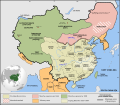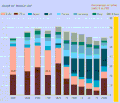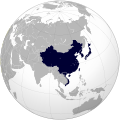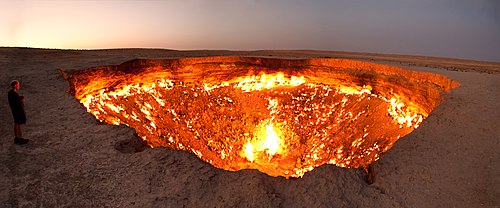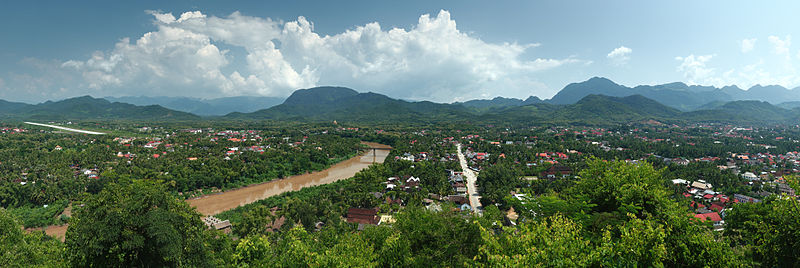
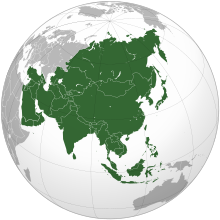 Asia (/ˈeɪʒə/ AY-zhə, UK also /ˈeɪʃə/ AY-shə) is the largest continent in the world by both land area and population. It covers an area of more than 44 million square kilometers, about 30% of Earth's total land area and 8% of Earth's total surface area. The continent, which has long been home to the majority of the human population, was the site of many of the first civilizations. Its 4.7 billion people constitute roughly 60% of the world's population. Asia shares the landmass of Eurasia with Europe, and of Afro-Eurasia with both Europe and Africa. In general terms, it is bounded on the east by the Pacific Ocean, on the south by the Indian Ocean, and on the north by the Arctic Ocean. The border of Asia with Europe is a historical and cultural construct, as there is no clear physical and geographical separation between them. It is somewhat arbitrary and has moved since its first conception in classical antiquity. The division of Eurasia into two continents reflects East–West cultural, linguistic, and ethnic differences, some of which vary on a spectrum rather than with a sharp dividing line. A commonly accepted division places Asia to the east of the Suez Canal separating it from Africa; and to the east of the Turkish Straits, the Ural Mountains and Ural River, and to the south of the Caucasus Mountains and the Caspian and Black seas, separating it from Europe. China and India traded places as the largest economies in the world from 1 to 1800 CE. China was a major economic power for much of recorded history, with the highest GDP per capita until 1500. The Silk Road became the main east–west trading route in the Asian hinterlands while the Straits of Malacca stood as a major sea route. Asia has exhibited economic dynamism as well as robust population growth during the 20th century, but overall population growth has since fallen. Asia was the birthplace of most of the world's mainstream religions including Hinduism, Zoroastrianism, Judaism, Jainism, Buddhism, Confucianism, Taoism, Christianity, Islam, Sikhism, as well as many other religions. (Full article...) Featured article In Japanese folklore, kitsune (狐, きつね, IPA: [kʲi̥t͡sɯne̞] ) are foxes that possess paranormal abilities that increase as they get older and wiser. According to folklore, the kitsune-foxes (or perhaps the "fox spirits") can bewitch people, just like the tanuki they have the ability to shapeshift into human or other forms, and to trick or fool human beings. While some folktales speak of kitsune employing this ability to trick others—as foxes in folklore often do—other stories portray them as faithful guardians, friends, and lovers. Foxes and humans lived close together in ancient Japan; this companionship gave rise to legends about the creatures. Kitsune have become closely associated with Inari, a Shinto kami or spirit, and serve as its messengers. This role has reinforced the fox's supernatural significance. The more tails a kitsune has—they may have as many as nine—the older, wiser, and more powerful it is. Because of their potential power and influence, some people make sacrifices to them as to a deity. (Full article...)Selected Country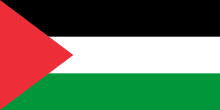 Palestine (Arabic: فلسطين, romanized: Filasṭīn), officially the State of Palestine (دولة فلسطين, Dawlat Filasṭīn), is a country in the southern Levant region of West Asia. It encompasses two disconnected territories — the West Bank and the Gaza Strip, collectively known as the Palestinian territories — within the larger region of Palestine. The country shares its borders with Israel to north, west and south, Jordan to the east and Egypt to the southwest. It has a combined land area of 6,020 square kilometres (2,320 sq mi) while its population exceeds five million people. Its proclaimed capital is Jerusalem while Ramallah serves as its administrative center and Gaza City was its largest city until massive population movements began in 2023 due to the Israeli invasion of the Gaza strip. Arabic is the official language. The majority of Palestinians practice Islam while Christianity also has a significant presence. The region of Palestine has played an important part in world history. The Canaanites, Israelites, Assyrians, Babylonians, Persians, Greeks, Romans and Byzantines all left their mark on the land. In addition to its historical significance, Palestine holds profound religious importance for Judaism, Christianity and Islam. Throughout history the region has experienced periods of coexistence and conflict between different religious and ethnic groups. Notably, during the Middle Ages, when Jewish communities faced persecution, they found refuge and protection under Muslim rule and the wider Islamic world. The Ottoman Empire, which controlled Palestine from the 16th century until its collapse at the end of World War I, provided a sanctuary for Jews fleeing persecution in Europe. The end of the Ottoman rule marked a new chapter in Palestine's history. Following World War I, the British Empire assumed control of the region under the League of Nations mandate. The British Mandate for Palestine, established in 1920, brought significant changes to the political and social landscape of the area, setting the stage for the conflicts and struggles that would follow. (Full article...)Featured biographyLuo Yixiu (Chinese: 羅一秀; 20 October 1889 – 11 February 1910), a Han Chinese woman, was the first wife of the later Chinese communist revolutionary and political leader Mao Zedong, to whom she was married from 1908 until her death. Coming from the area around Shaoshan, Hunan, in south central China – the same region as Mao – her family were impoverished local landowners. Most of what is known about their marriage comes from an account Mao gave to the American reporter Edgar Snow in 1936, which Snow included in his book Red Star Over China. According to Mao, he and Luo Yixiu were the subject of an arranged marriage organised by their respective fathers, Mao Yichang and Luo Helou. Luo was eighteen and Mao just fourteen years old at the time of their betrothal. Although Mao took part in the wedding ceremony, he later said that he was unhappy with the marriage, never consummating it and refusing to live with his wife. Socially disgraced, she lived with Mao's parents for two years until she died of dysentery, while he moved out of the village to continue his studies elsewhere, eventually becoming a founding member of the Communist Party of China. Various biographers have suggested that Mao's experience of this marriage affected his later views, leading him to become a critic of arranged marriage and a vocal feminist. He married three more times, to Yang Kaihui, He Zizhen and Jiang Qing, the last of whom was better known as Madame Mao. (Full article...)General imagesThe following are images from various Asia-related articles on Wikipedia. Featured pictureThe Darvaza gas crater, also called the "Door to Hell" or the "Gates of Hell" by locals, a crater of natural gas that has been burning since 1971, is located in the Karakum Desert in Turkmenistan. The crater is a major tourist attraction, with hundreds of visitors arriving each year.
Did you know...
Updated: 6:33, 14 February 2024 In the news
Related portalsMajor Religions in Asia Middle East Central Asia and Surroundings Indian Subcontinent Southeast Asia East Asia Selected panorama
Panorama of the city of Luang Prabang in northern Laos, as seen from Phu Si hill. The city was formerly the capital of a kingdom of the same name, and after Laos's independence from France, it was the royal capital and seat of government of the Kingdom of Laos. This view features the Nam Khan river on the left, and Luang Prabang International Airport on the very far left. TopicsCategoriesAssociated WikimediaThe following Wikimedia Foundation sister projects provide more on this subject:
More portalsShortcuts to this page: Asia portal • P:ASIA Purge server cache |











